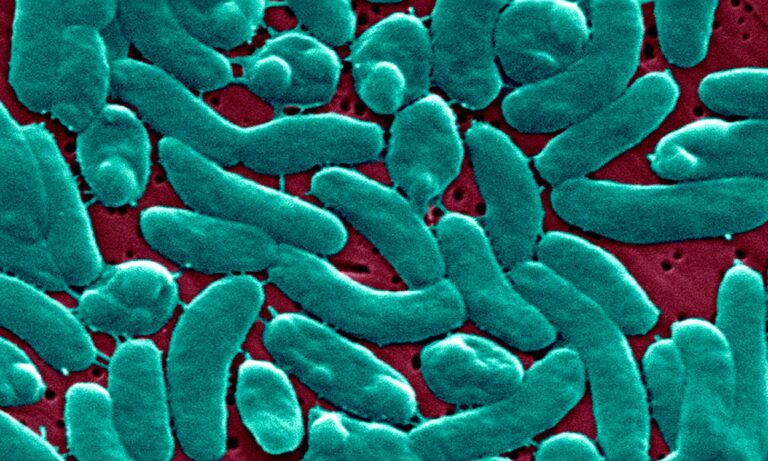CDC warns US doctors of deadly Vibrio vulnificus outbreak as flesh-eating bacteria claims more lives

On Friday 1 September 2023, the Centers for Disease Control and Prevention (CDC) issued a national health alert with the aim of warning all US doctors to be on the lookout for infections related to the nasty, flesh-eating bacteria Vibrio vulnificus.
Earlier this summer, between the months of July and August, the US saw widespread heatwaves and above-average coastal sea surface temperatures. As stated by CNN, Connecticut, New York, and North Carolina all reported more severe and fatal Vibrio vulnificus infections, with at least five people having died from it in those states.
Here’s everything you need to know about the bacteria, why it’s currently spreading in the country, and how to keep safe from it.
@everariasmd #stitch with @malamamaofficial #learnontiktok #vibriovulnificus #flesheatingbacteria #physician #medicine #doctor #tiktokmed #doctorreacts #medtok #healthtok #healthcare
♬ original sound - Ever Arias, MD
What is Vibrio vulnificus?
Vibrio vulnificus (often shortened to V. vulnificus) is a species of Gram-negative, motile, curved rod-shaped, pathogenic bacteria of the genus Vibrio. V. vulnificus is related to V. cholerae, aka the causative agent of cholera.
The bacteria naturally live in coastal waters and proliferate in the warmer months when ocean temperatures are at their highest. While most people have become sick after eating raw or undercooked seafood, people can also get infected after swimming in the ocean with an open wound, such as a recent piercing or tattoo or even through a minor cut or scrape.
Individuals can also be exposed to the bacteria when hurricanes, floods and storm surges force coastal waters inland. For example, CNN reported that in the days after Hurricane Ian in 2022, Florida health officials reported 38 cases and 11 vibriosis-related deaths associated with the storm.
It’s no surprise then that cases have been on the rise again in the US, with Category 3 Hurricane Idalia recently wrecking Florida. Until now, the bulk of US infections were reported by people who lived in Gulf Coast states because of the bacteria liking warmer temperatures. But, as the climate crisis warms the oceans and brings more heat waves, doctors have treated an increasing number of cases in states along the East Coast.
Vibrio vulnificus symptoms
It should be noted that not all species of Vibrio bacteria are considered flesh-eating. In fact, about only a dozen species make humans sick. People who develop an infection often have diarrhoea, stomach cramps, nausea, vomiting, fever and chills.
Vibrio vulnificus is one of the bacteria that can cause what’s commonly known as a flesh-eating infection. Of the 150 to 200 Vibrio vulnificus cases reported to the CDC every year, about one in five die from the infection, sometimes within one or two days of getting sick.
Necrotizing fasciitis, also known as the “flesh-eating disease,” is a rare and life-threatening infection that can happen if a wound gets infected. It eats away at the skin, muscles, nerves, fat and blood vessels around an infected wound.
In severe cases, people can develop septicemia—when the bacteria enters the bloodstream and spreads. This may also lead to septic shock, when blood pressure takes a dangerous drop; cause sepsis, in which the body mounts a strong immune response that shuts down important organs like the heart or the kidneys; and lead to acute respiratory distress syndrome (ARDS), a condition in which oxygen from the lungs doesn’t reach the blood.
How dangerous is Vibrio vulnificus?
New studies show that the fatality rate is about 25 per cent with wound infections. However, it’s much higher for people who are exposed to the bacteria by eating contaminated food.
With skin infections specifically, doctors will take samples from the infected area to determine if V. vulnificus is what’s causing the problem. Then, they’ll drain any abscesses and treat the infected site.
In some extreme cases, a person may need surgery or surgeons may even have to amputate the affected limb to keep the infection from spreading. The CDC says people who suspect they have an infection should get treatment quickly since they will have a better chance of surviving the infection. Older people are generally at greater risk.
What’s even scarier is that this bacteria has developed some antimicrobial resistance, and about 50 per cent of infections don’t respond to antibiotics anymore.
CDC recommendations for the public
In its recent statement, the national public health agency also shared the following steps for anyone in the US looking to keep safe from the bacteria:
– Stay out of salt water and brackish water if you have an open wound or cut.
– If you get a cut while you are in the water, leave the water immediately.
– If your open wounds and cuts could come in contact with salt water, brackish water, or raw or undercooked seafood, cover them completely with a waterproof bandage.
– Wash open wounds and cuts thoroughly with soap and clean, running water after they come in contact with salt water, brackish water, or drippings from raw or undercooked seafood.
– Cook raw oysters and other shellfish before eating.
– Always wash your hands with soap and water after handling raw shellfish.
– Seek medical attention right away for infected wounds.





